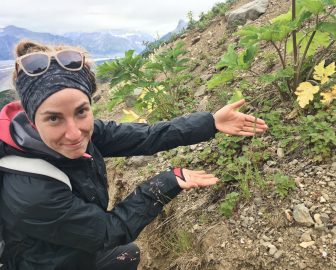
Elizabeth Lombardi shows off some of her research subjects in the Alaskan Rocky Mountains. Image: Elizabeth Lombardi
Editor’s note: This is part of a series of stories about how COVID-19 derailed the research of many aspiring Great Lakes scientists. It is edited for length and clarity.
By Amelia Cole
Elizabeth Lombardi is a doctoral candidate in the Department of Ecology and Evolutionary Biology at Cornell University.
The novel coronavirus put her research of viral diversity in wild plants in upstate New York and the Rocky Mountains on hold.
“My local project is the one that’s probably been the most impacted so far by COVID-19. That field work this summer is currently not happening.
“A typical day for me is still quite full, still quite busy with continuing to write and analyze and do the work that I can do on the computer. I’m also teaching, and that actually takes up a significant amount of my time. I’m the head TA for a 260-person lecture class on ecology. So, a fair amount of my time is dedicated to supporting our students from afar.
“I think that there’s a tendency for a lot of people that work on independent research projects to get a little, you know, obsessive, and they’re super driven. They’re super driven to keep working, and the culture supports busy-ness. So, it is hard to kind of reconcile this idea that you should always be working on something, which is prevalent in academia–and just in general I think people think that—with grief, honestly and sadness and insecurity. It’s hard.
“I am petitioning the university to be allowed to conduct basic fieldwork that would allow me to finish my data collection for my degree in the Adirondacks. I’m hopeful, but I have yet to hear about that. That loss of data would be a loss of longitudinal data—I’ve been doing this for four years; this is my fifth year—and also a potential loss of funding. I have to use a significant grant I just got within a year to do some deep sequencing of the viral genome.
“For me, the hardest part is the insecurity that comes along with not knowing what’s going to happen to the economy, both now and when I’m expecting to finish. I’m not alone in this. I know that there are other people who are graduate students now or are early-career researchers who are in relationships or have family commitments, and so economic insecurity is something that we already deal with, and this just exacerbates that, especially with hiring freezes.
“I have funding for next year, but nothing is guaranteed beyond that. If I don’t get to collect any data this year, I would definitely have to stay an extra year. Because there’s nothing guaranteed, completion isn’t guaranteed. But my department and the university in general have been really committed to supporting graduate students through this, and just in general through the end of their degree completion.
“I don’t think anybody in the university for sure knows how to do this yet, but I think everybody is really trying to support the people who are vulnerable to losing important data right now. I’m hopeful, but I also recognize that my dissertation might look different than what it would have otherwise.
“Relative to some of the other students in my department I have it pretty good. I know of some students who aren’t going to be able to do any data collection at all this summer because they work internationally. There are definitely a lot of plans being scratched and totally re-worked so that this summer isn’t a complete loss of data.
